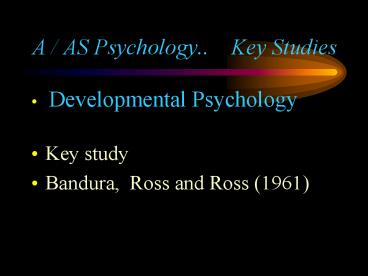A AS Psychology'' Key Studies - PowerPoint PPT Presentation
1 / 39
Title:
A AS Psychology'' Key Studies
Description:
Imitative aggression. Non-imitative aggression. physical & verbal. Bandura ... condition displayed MUCH more non-imitative (non-copied) aggressive behaviour ... – PowerPoint PPT presentation
Number of Views:83
Avg rating:3.0/5.0
Title: A AS Psychology'' Key Studies
1
A / AS Psychology.. Key Studies
- Developmental Psychology
- Key study
- Bandura, Ross and Ross (1961)
2
Bandura, Ross Ross
- The Bobo Doll Study
3
(No Transcript)
4
The Question
- The nature - nurture debate
- Do children learn behaviour from the behaviour
they see around them?
5
Specifically.
- Can aggressive behaviour be learned by
observation? - NB This was the study that triggered the TV
violence debate
6
Before we begin.
- 1 List two behaviours you think might be
learned by watching others - 2 List two behaviours you think could not be
learned in this way
7
Bandura Ross Ross The BOBO doll study
- The participants
- 72 children (Stanford University nursery school)
- 36 boys 36 girls
- age range 37 months - 69 months
- Mean age 52 months
8
Bandura Ross Ross The BOBO doll study
- TWO adult role models
- one male and one female
- and a female experimenter
9
Bandura Ross Ross The BOBO doll study
- Method - an experiment
- there were three conditions
- 24 children in each condition
10
Bandura Ross Ross The BOBO doll study
- The THREE CONDITIONS
- Non aggressive condition
- Aggressive condition
- Control condition
11
(No Transcript)
12
Bandura Ross Ross The BOBO doll study
- Non aggressive condition
- and
- Aggressive condition
- There were male and female role models
- 12 children in each
13
Bandura Ross Ross The BOBO doll study
- Thus
- 6 boys saw aggressive male
- 6 boys saw non-aggressive male
- 6 boys saw aggressive female
- 6 boys saw non-aggressive female
14
Bandura Ross Ross The BOBO doll study
- Thus
- 6 girls saw aggressive female
- 6 girls saw non-aggressive female
- 6 girls saw aggressive male
- 6 girls saw non-aggressive male
15
Bandura Ross Ross The BOBO doll study
- Level 1 Independent Variable (IV)
- aggressive or non-aggressive role model
- Level 2 Independent variable (IV)
- Same sex or opposite sex role model
16
Bandura Ross Ross The BOBO doll study
- Write a TESTABLE two-tailed hypothesis for the
study - Write a TESTABLE one-tailed hypothesis for the
study
17
Bandura Ross Ross The BOBO doll study
- In order to ensure that each group contained
equally aggressive children they were all rated
for aggression before the experiment - rated on -
- physical aggression, verbal aggression
- aggression to inanimate objects
- aggression inhibition (self control)
18
Bandura Ross Ross The BOBO doll study
- What happened then?
- Children taken one at a time
- Phase one of the experiment
- Modelling the behaviour phase
19
(No Transcript)
20
(No Transcript)
21
Bandura Ross Ross The BOBO doll study
- What happened then?
- Phase two of the experiment
- The AROUSAL phase
- This was necessary to provoke the children
22
Bandura Ross Ross The BOBO doll study
- What happened then?
- Phase three of the experiment
- The OBSERVATION phase
23
Bandura Ross Ross The BOBO doll study
- What was observed?
- The criteria
- Imitative aggression
- Non-imitative aggression
- physical verbal
24
(No Transcript)
25
Bandura Ross Ross The BOBO doll study
- The results
- IMITATION - the children in the aggressive
condition imitated many of the modelled physical
and verbal aggressive behaviours - they also imitated non-aggressive behaviours
26
Bandura Ross Ross The BOBO doll study
- The results
- IMITATION - the children in the NON- aggressive
condition imitated very few of the modelled
behaviour - 70 had zero scores
27
Bandura Ross Ross The BOBO doll study
- The results
- NON-IMITATION
- the children in the aggressive condition
displayed MUCH more non-imitative (non-copied)
aggressive behaviour
28
Bandura Ross Ross The BOBO doll study
- The results
- NON-AGGRESSIVE CONDITION
- the children in the non-aggressive condition
spent more time playing with the toys (dolls etc)
also more time doing nothing
29
Bandura Ross Ross The BOBO doll study
- GENDER RESULTS
- Boys imitated more physical aggression (but not
verbal)
30
Bandura Ross Ross The BOBO doll study
- GENDER RESULTS
- Boys more aggressive after watching MALE
aggressive model - Girls more aggressive after watching FEMALE
aggressive model
31
(No Transcript)
32
Bandura Ross Ross The BOBO doll study
- The conclusion
- Learning can take place by observation
- no classical or operant conditioning
- Children more likely to learn from same sex
models
33
Bandura Ross Ross The BOBO doll study
- The conclusion
- Bandura suggested Freuds theory of
identification may be used to explain how
learning took place - Which of Freuds stages might these children have
been in?
34
Bandura Ross Ross The BOBO doll study
- Thinking about BPS guidelines
- WAS THIS STUDY ETHICAL?
- What are the issues?
- If not ethical WHY not?
35
Bandura Ross Ross The BOBO doll study
- Thinking about methodology
- Does this study have ecological validity?
- If not ecologically valid - why not?
36
Bandura Ross Ross The BOBO doll study
- Thinking about the participants
- To whom can we generalise the findings?
37
Bandura Ross Ross The BOBO doll study
- The debate as regards children learning
aggressive behaviour from watching violence on TV - How might watching TV differ from the experience
of the children in the Bandura experiment?
38
Bandura Ross Ross The BOBO doll study
- There were four predictions
- (hypotheses) in this
- MATCHED SUBJECTS experiment
- What were they?
39
Bandura Ross Ross The BOBO doll study
- The end































